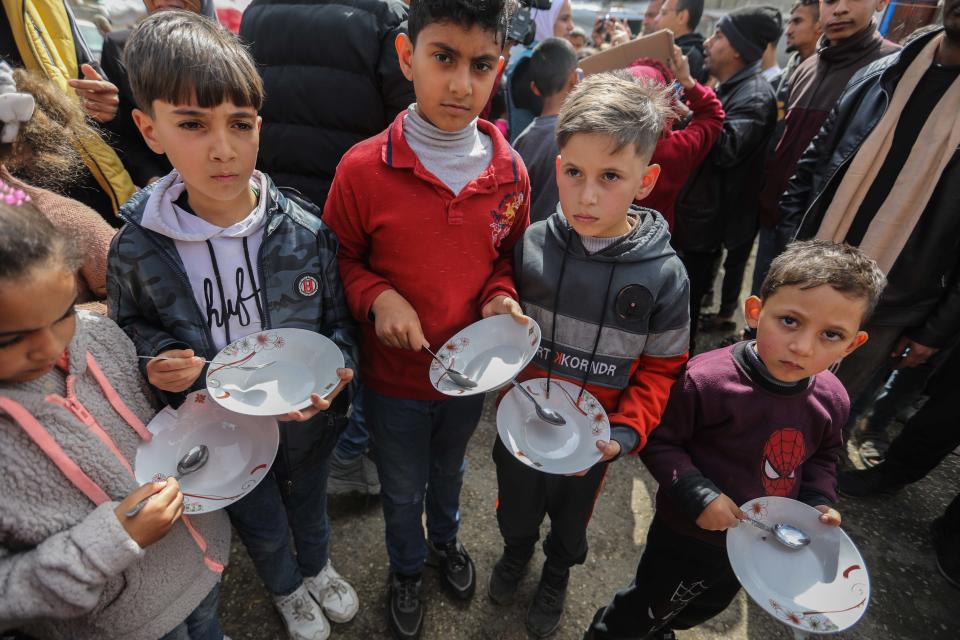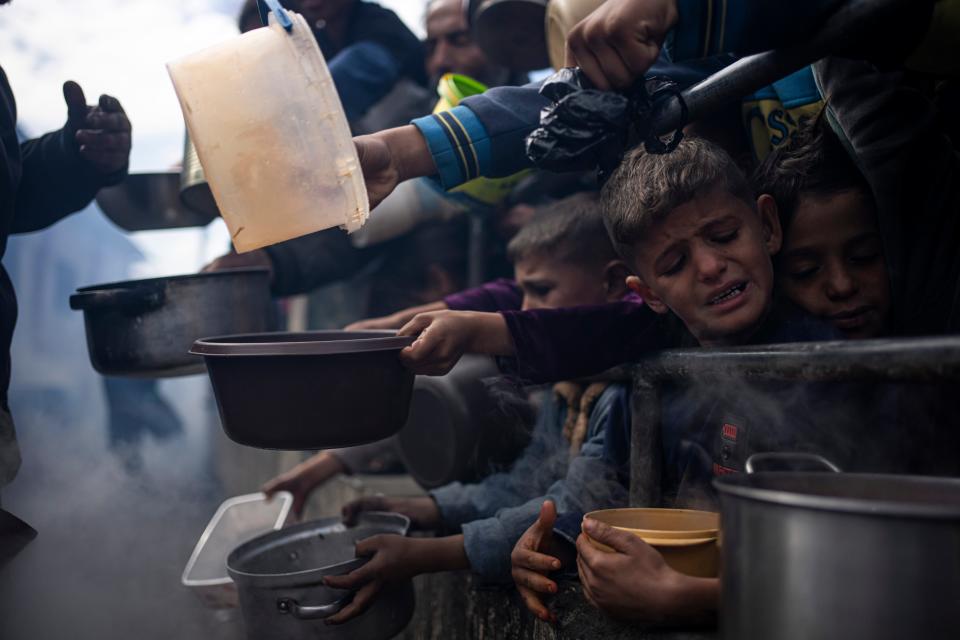As Gaza war hits 5 months, humanitarian crisis rages as bombardment continues
Five months after a stunningly brutal attack on Israel prompted the devastating siege of Gaza, the numbers of displaced are growing as videos showing the expanding destruction emerge almost daily from the embattled enclave.
More than 1,500 Hamas-led militants stormed across the fortified border Oct. 7, killing almost 1,200 people in Israel before retreating back into Gaza with more than 240 hostages in tow. Within hours of the attack, Israel unleashed an aerial bombardment on Gaza, and on Oct. 27 the ground invasion began ? resulting in a staggering humanitarian crisis over the following months that grows increasingly dire by the day.
Today more than 30,000 Palestinians are dead, tens of thousands more are wounded, hundreds of thousands are struggling to avoid starvation, and 1.7 million have been displaced from their homes. Talks aimed at reaching a cease-fire have been unsuccessful, and the Israeli military continues bombardment on the enclave.
Images of the suffering have been seen around the world, resulting in international protests. The U.S. is the largest provider of aid to Gaza, sending more than $180 million in humanitarian assistance since the war began. But the few hospitals still able to provide care are overwhelmed. The few aid trucks that get through are overrun by desperate families at risk of starvation.
The U.N. Relief and Works Agency says that 17,000 children have been orphaned and that in northern Gaza, 1 in 6 children under age 2 are acutely malnourished. UNICEF regional director Adele Khodr said the demand for nutritious food, safe water and medical services is growing more severe as humanitarian agencies struggle to function in the war zone. People are hungry, exhausted and traumatized, Khodr said.

"The child deaths we feared are here and are likely to rapidly increase unless the war ends and obstacles to humanitarian relief are immediately resolved," Khodr said. "We need reliable, multiple entry points that would allow us to bring aid in from all possible crossings ... with no denials, delays and access impediments."
With truck convoys unable to meet the demand, the U.S. Department of Defense and the Jordanian Royal Air Force have collaborated to airdrop 70,000 meals into Gaza in recent days. It's not nearly enough.
The Biden administration, Egypt and Qatar are brokering talks aimed at resolving the crisis. The latest proposal calls for a six-week cease-fire, release of the sick, wounded, elderly and female hostages, and a large-scale increase in crucial humanitarian aid, the White House said.
"Responding to the humanitarian crisis and the needs of the Palestinian people has been a priority since Day One," White House national security communications adviser John Kirby said Monday. But in the U.N. Security Council, calls for an immediate cease-fire have been vetoed by the U.S., where officials maintain such a resolution is meaningless and could disrupt efforts at reaching a negotiated agreement.
A war with no walls: Inside the devastating impact of Israel-Hamas war around the globe
'Western hypocrisy is difficult to comprehend'
Dr. Mehran Kamrava, a professor of government at Georgetown University Qatar, says both sides have been guilty of crimes against humanity. But the Israeli response has gone way too far, he said.
"For millions of people across the world, the West has lost its moral mooring," Kamrava said. "Western hypocrisy, loudly proclaiming the virtues of human rights but ignoring the deaths of thousands of Palestinians in most horrific ways, is difficult to comprehend. How could the United States, that self-declared bastion of peace around the world, repeatedly veto United Nations cease-fire resolutions to stop the war?"

Israel, Hamas at odds on cease-fire proposals
Kirby says Israel has agreed to a cease-fire framework and "now the onus is on Hamas to do the same." Senior Hamas official Osama Hamdan, however, insists that Israel's military withdraw from Gaza and that displaced Palestinians be allowed to return to their homes. Meanwhile, Israeli Prime Minister Benjamin Netanyahu is also raising concerns, refusing to send a delegation to the talks in Cairo until Hamas provides an accounting of the hostages, including how many are alive and their conditions.
Hamas has said that the hostages are being held by multiple militant groups ? the Palestinian Islamic Jihad, the Mujahideen Brigades and Al-Nasser Salah al-Deen Brigades are among those claiming custody ? scattered around Gaza and that a cease-fire is required to track all the hostages down. The United States has for years designated Hamas a terrorist organization.
Zev Faintuch, senior intelligence analyst at the security firm Global Guardian, says Israel won't be deterred from crushing Hamas and hunting down Hamas leaders.
"No external pressure will prevent Israel from finishing the job ? that is, eradicating Hamas’ infrastructure, degrading its fighting capabilities and creating the foundation for a Hamas-free future Gaza," he said.
Israel's war on Gaza Strip: Mapping the devastation
Americans split politically on halting military aid to Israel
According to one poll, 52% of Americans believe the U.S. should halt weapons shipments to Israel until its military pulls out of Gaza, while 27% disagree and 21% are unsure, according to a new YouGov poll commissioned by the Center for Economic and Policy Research. The poll, however, shows a partisan split: 62% of President Joe Biden's supporters favor the halt in shipments, while only 30% of Donald Trump supporters want the shipments discontinued.
Will Hamas decide to compromise?
Avi Melamed, a former Israeli intelligence official and author of “Inside The Middle East: Entering A New Era," said Hamas' negotiating strength is fading as the holy month of Ramadan draws near. Netanyahu's resolve shows no signs of winding down the fighting until Hamas is broken and the hostages are returned, Melamed said.
Hamas, he said, will need to compromise. The final deal is likely to provide a temporary pause, but the war won't end, and Israel will once again set its military sights on the crowded city of Rafah.
"The deal won’t likely be perfect for Israel, as no doubt it will need to free some terrorists with blood on their hands," he said.
In the long term, Hamas is drawing "furious" criticism in the Arab world and will be weakened, Melamed said. He foresees a revitalized Palestinian Authority that Biden and the West have called for, with Hamas most likely playing a role.

Hamas attack was among world's deadliest
The Hamas attack was the third-deadliest terrorist attack since data collection began in 1970, according to the Washington-based Center for Strategic & International Studies. The deadliest was the 9/11 attack by al-Qaida on the U.S. in 2001 that killed almost 3,000 people, followed by an Islamic State attack in Tikrit, Iraq, in 2014 that killed 1,700.
On Oct. 7, the Hamas-led militants killed almost 1,200 people after crashing through a 40-mile-long border wall outfitted with machine-gun turrets and observation towers, cameras, radars, barbed wire and an underground concrete barrier to frustrate tunneling. Hamas struck on a Saturday morning after the end of Sukkot, a weeklong celebration to commemorate the harvest season and the time Jews lived in the desert after being freed from slavery in Egypt.
The militants used drones to drop explosives onto the observation towers, blew holes in the border fence with explosives and bulldozers to smash open gaps large enough to allow vehicles to roll through. Several military outposts were struck first, slowing the defensive response, and communities, kibbutzim and a large music festival were invaded in the deadly rampages.
U.N. envoy Pramila Patten said this week that evidence indicates the militants committed rape and "sexualized torture'' of women during the attack and on some of the hostages
Scores of militants were killed then, and Israel says it has killed more than 10,000 since. More than 240 Israeli soldiers have also died in the ground assault, and more than 100 hostages remain captives of Hamas and other militant groups.
The Israeli government blames the civilian death toll in Gaza on Hamas efforts to hide among civilians they use as human shields. Netanyahu has vowed to keep fighting until Hamas and its leaders are crushed.
"Netanyahu’s relentless refusal to halt the war will leave scars on the collective memory of Israelis for years to come," Kamrava said. "President Biden will go down in history as Netanyahu’s unwitting enabler in one of the 21st century’s worst episodes of mass killings."
This article originally appeared on USA TODAY: Israel-Hamas war in Gaza hits 5 months as humanitarian crisis rages
